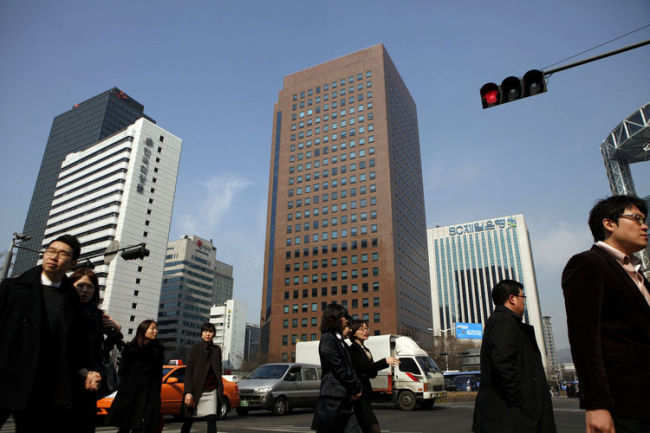[THE INVESTOR] On Nov. 11, 2010, with just 10 minutes for the stock market to close in Seoul, traders of Deutsche Bank dumped 2.4 trillion won ($2.05 billion) worth of Korean shares, triggering a 2.7 percent drop on the country’s main KOSPI index.
The massive and coordinated sell-off by Deutsche employees in Hong Kong and Seoul wiped out 28 trillion won in value from Korea’s equity market, but the German bank reaped a profit of 44.9 billion won through derivative positions it had built in advance.
The massive and coordinated sell-off by Deutsche employees in Hong Kong and Seoul wiped out 28 trillion won in value from Korea’s equity market, but the German bank reaped a profit of 44.9 billion won through derivative positions it had built in advance.

Although this is remembered as one of Korea’s biggest stock market routs, justice seems to not be forthcoming for all those responsible.
While the Korean employee of Deutsche Securities Korea and the company itself were convicted by a Seoul court in January, three other key suspects -- all foreign nationals -- are still at large, having not appeared in court since the trial began here in 2012.
A Korean lawyer involved in multiple civil cases in relation to the 2010 stock rout likened it to a crime of theft, in which “three thieves who leaped over the fence to steal are running free, while the one who stood guard outside is nabbed.”
“Nov. 11 Deutsche options shock”
Deutsche Bank Hong Kong’s index arbitrage trading team, headed by Derek Ong, was having a tough month in November 2010. Total returns on its trades were running short of the target, at 5.9 million euros ($6.65 million) at the end of September. The full year’s goal was 9 million euros.
They needed something big to mark a dramatic turnaround.
According to information obtained by The Korea Herald, the team first informed Deutsche Securities Korea on Nov. 8, 2010 that it may have a very high volume trade of Korean stocks on Nov. 11.
In following exchanges of emails and messenger chats in the next three days, Ong and other Hong Kong-based employees of Deutsche discussed details of the trade with Park Do-yoon in Seoul.
For less than eight minutes before the stock market’s close in Seoul on Nov. 11, Deutsche unloaded 2.44 trillion won in Korean stocks at discounts of up to 10 percent, prompting a 2.7 percent decline in the KOSPI index.
Park in Seoul filed a report on the trades one minute after the deadline required by Korea’s securities trading law. “Late input (report) would increase impact,” he had told Ong and others via a messenger service at around noon. Deutsche earned 43.6 billion won in gains through derivatives positions built between 14:12:24 and 14:49:59 with just 1.5 billion won.
Traumatic event
On Korea’s derivatives market, the wounds left by the Deutsche stock rout are still raw.
The market, which in 2011 was the world’s largest by trade volume on heavy retail investor activity, shrank sharply after the government tightened rules in response to the 2010 event.
“The incident left scars on the Korean market,” said Nam Gil-nam, a researcher at Korea Capital Market Institute in Seoul.
It also prompted local investors to look anew at the derivative market, particularly at the risks involved, he said.
Deutsche’s Korean business and reputation suffered a major blow from the scandal, but it seems to be on the path to recovery now.
Shortly after the market rout, the financial regulator imposed a six-month suspension on some operations of the bank, the heaviest penalty it had ever imposed on a financial company.
While still weak in stockbroking, the investment bank now leads in mergers and acquisitions advisory services in Korea, landing six major deals worth over a combined 6.6 trillion won in 2015.
The case is being tried at a Seoul court. The first guilty verdict came out in January this year, sentencing Park to a five-year jail term and slapping Deutsche Securities Korea with a fine of 1.5 billion won, on top of confiscation of all illicit proceeds.
“What the defendants have done is a grave crime against the market and it dented investor confidence,” said judge Shim Gyu-hong of Seoul Central District Court in the ruling.
The trial for Ong and two other foreign suspects is on hold, however, as Korean authorities have failed to identify their whereabouts. They are citizens of the U.K., France and Australia, and all have left Deutsche.
Both Park and Deutsche have appealed.
Deutsche Korea and its legal representative Kim & Chang declined to comment.
By Lee Sun-young & Park Han-na
(milaya@heraldcorp.com)
(hnpark@heraldcorp.com)
-
Articles by Korea Herald




![[KH Explains] No more 'Michael' at Kakao Games](http://res.heraldm.com/phpwas/restmb_idxmake.php?idx=644&simg=/content/image/2024/04/28/20240428050183_0.jpg&u=20240428180321)





![[Grace Kao] Hybe vs. Ador: Inspiration, imitation and plagiarism](http://res.heraldm.com/phpwas/restmb_idxmake.php?idx=644&simg=/content/image/2024/04/28/20240428050220_0.jpg&u=)








